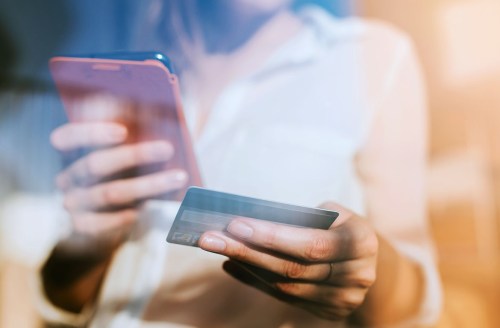Our editors independently select these products. Making a purchase through our links may earn Well+Good a commission
Conquering Money Anxiety Can Be Easier With These Tips and Tools
Achieving financial health is an important part of overall wellness. Here are a few tips on conquering money anxiety from experts.

When one of the co-founders of her company stepped away, it was a curveball that propelled Leslie Bailey, co-founder and CEO of Indy Maven, a lifestyle media company and community in Indianapolis, into a spiral. “I was suddenly responsible for all aspects of the business without someone there on a daily basis to work alongside,” she shares. “I think it was the first time in my life where I didn’t have someone holding my hand when it came to money, and it triggered huge insecurities and imposter syndrome for me. I didn’t feel confident or experienced enough to run a business from that standpoint.”
Experts in This Article
Grace Huntley, LMHC, is a psychotherapist based in NYC.
Leslie Bailey is a writer, editor, media consultant, and founder of Indy Maven.
Rosa Pruneda is a public relations, influencer marketing and social media consultant helping multicultural entrepreneurs share their stories with the world.
Bailey’s reaction to assuming more financial responsibility is common, and for many people, a big part of the process of becoming financially independent involves conquering money anxiety. Doing so requires first figuring out where your trepidations about money stem from and then using some mindfulness tools to help you override or manage any limiting beliefs or blocks you have around handling your finances.
“Once the trigger is isolated or identified, it’s easier to then ask yourself when was the first time I felt like this? How you feel will identify the deeper issue,” says financial advisor Eva Macias.
To pinpoint yours, psychotherapist Grace Huntley, LMHC, encourages auditing your last five purchases and jotting down how they made you feel. If a purchase triggered negative emotions, naming the specific feelings (shame, guilt, fear) can also help offer a roadmap on how to tend to yourself and your emotions.
Doing so can help you develop a healthy relationship with money, according to Huntley. “Once you have a solid understanding of what your beliefs about money are, where they come from, and how they’re affecting you, you can work on pushing back on some of the distorted beliefs about money that may be causing you undue anxiety,” she says.
What is money anxiety, exactly?
While some stress about money is both natural and normal, says Huntley, if it’s not managed, it can turn into money anxiety. “When it begins to cause dysfunction in our day-to-day lives and relationships, it can be defined as a constant worry and unease about money that prevents effective spending and management,” she says.
For many, money anxiety can manifest as hoarding (not even spending on necessities) or financial self-sabotaging. According to Huntley, that could look like passing up promotions or opportunities for fair pay, or giving your work away for free due to a sense of guilt.
Often, our feelings and relationship with money are defined or influenced by our family and culture from an early age. “Many times, limiting beliefs will arise via messages we internalized about money while growing up or from the communities we find ourselves in as adults,” says Huntley.
This was the case for Rosa Pruneda, consultant and founder of RosaEPR, who started experiencing anxiety about money when the time came to negotiate the salary for her first job after college. “Personally and culturally, I was raised to be grateful for what I was offered and negotiating for more money wasn’t something I felt comfortable doing,” she says. “Healing generational money wounds is very challenging, especially if you’re one of the first in your family to begin questioning the way things have always been done; however, it gets easier with financial mentors, resources, and support.”
Reframing your relationship with money
Money is an area where it’s easy to sink into the “shoulds,” says Huntley: I should be saving more. I shouldn’t ever spend that much on a haircut. I should be making X amount if I want to go on this vacation. I shouldn’t have gone out to dinner last week. But moving away from that type of negative self-talk and replacing it with a more positive inner dialog can help quell anxious feeling about money before they turn into dysfunction.
For Bailey, something else that proved beneficial was building a toolbox to help her move through, and past, her anxiety about money. “In the last year, I did three very specific things to try to mend my relationship with money, and I very much attribute my new and improved relationship with it to them,” she shares.
First, she hired a sales coach, then she started adding more financial books to her reading list like You Are A Badass at Making Money by Jen Sincero. Finally, she joined a supportive group of other people who were also working on conquering money anxiety.
You may find it beneficial to hire a financial planner or advisor who can help you build your financial accumen and feel more confident handling your funds. Or, unraveling old money wounds with a licensed therapist may prove helpful, too.
Oh hi! You look like someone who loves free workouts, discounts for cult-fave wellness brands, and exclusive Well+Good content. Sign up for Well+, our online community of wellness insiders, and unlock your rewards instantly.
Sign Up for Our Daily Newsletter
Get all the latest in wellness, trends, food, fitness, beauty, and more delivered right to your inbox.
Got it, you've been added to our email list.








